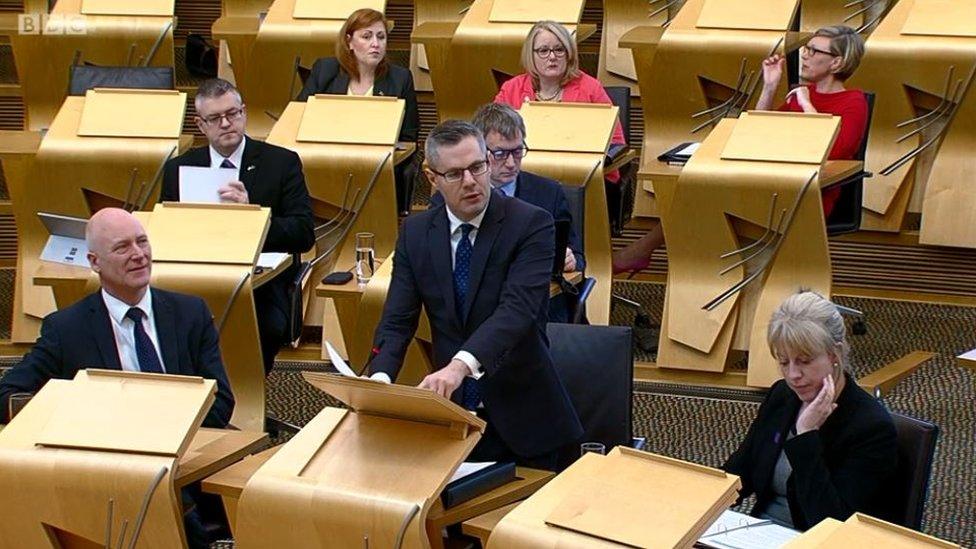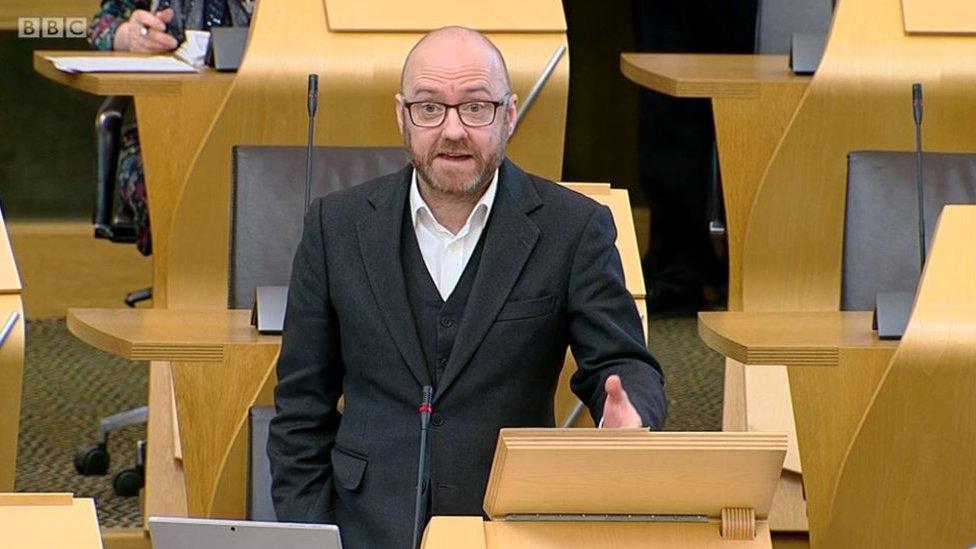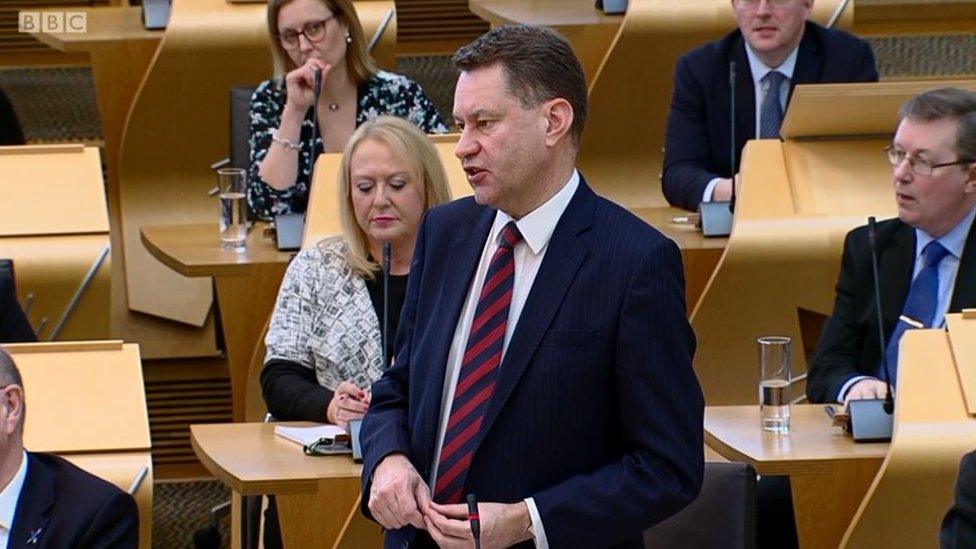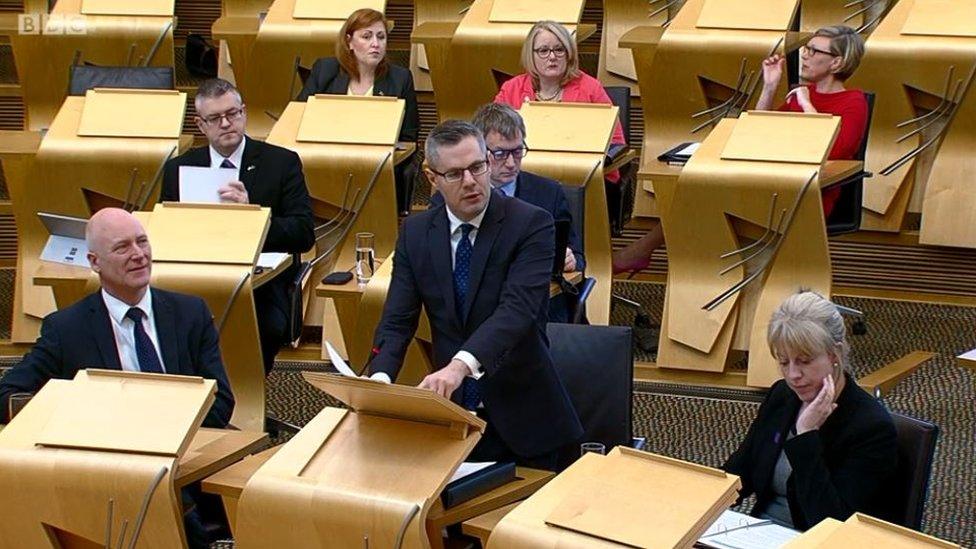A token debate on a historic day
- Published

Derek Mackay saw his tax proposals approved at Holyrood
It was an historic moment. Holyrood making substantial use of income tax powers for the first time. MSPs voting for the biggest change in taxation since the advent of devolution.
As is so often the case with such moments, there was a certain lassitude about proceedings. A sense of role play. All passion spent, a sense of a token, faintly totemic debate.
I do not remotely blame our MSPs for this. The budget and tax debate has been, understandably and rightly, prolonged.
Murdo Fraser, he of the Conservatives, noted as he opened his remarks that it seemed as if Holyrood had been debating tax for months. Only one correction, Murdo. You HAVE been debating tax for months.
We had an outline of taxation principles, partly reliant upon Adam Smith, which invited a widespread debate. We then had the draft budget.
After detailed and difficult negotiation, the deal between the SNP and the Greens, driven by the Finance Secretary Derek Mackay and Patrick Harvie of the Greens.
Then we had the stage one scrutiny, the stage one debate and vote, stage two amendments, today's tax resolution. And tomorrow, finally, the stage three vote on the budget.
All of which makes for thorough and welcome scrutiny. A job done. It adds to the sense of serious politics. At the same time, inevitably, it may remove a little of the drama. Hence the faint sense of ennui around the chamber today.

Patrick Harvie struck a deal with Mr Mackay for the second year running
Still, does one always crave drama? I, for one, do not. But I have been genuinely struck by the extent to which the people of Scotland have engaged with this tax debate. Not just in outline but in detail.
Entirely reasonably, folk are following the issue very closely. Concerned about the impact upon their family's finances. But concerned too about the wider impact on Scotland. This one has really grabbed attention.
But to the debate. If shorn of theatrics, the discourse was redolent with substance. Derek Mackay spoke well, arguing that his package was fair, protecting the lowest paid while attempting to stimulate the economy with productive investment.
It is my impression that those on the SNP benches, including ministers, who follow economic matters most closely are mildly anxious.
They know that they are increasing the overall burden of income tax in Scotland - despite their understandable emphasis on the point that the majority will pay less. They know that higher taxation, if pushed too far, might tend in principle to depress already sluggish economic growth.
They know, they know. Hence the caution. Hence the emphasis on measures in the budget, funded by taxation, which are designed to boost business. Hence the balance struck on taxation.

Murdo Fraser said it seemed like MSPs had been debating tax rates for months
Intriguingly, it was Patrick Harvie of the Greens who chided Mr Mackay most stridently over his oratory. Intriguing because it is the Greens whose votes ensure the passage of the tax resolution and tomorrow's budget.
Mr Harvie didn't like the talk from the minister of Scotland being the lowest taxed part of the UK for the majority. You didn't construct an egalitarian society on such talk, he argued, advising his temporary chum to mind his language.
Mr Fraser of the Tories offered reassurance to Mr Harvie - in a way. The SNP was not engaged in a low tax endeavour, he said. Rather they would make Scotland, overall, the most highly taxed part of the UK, breaking a promise to protect basic rate taxpayers.
In vain, did the SNP's John Mason remind Mr Fraser that the SNP lacked a majority to implement its manifesto in full. With a wicked grin, Mr Fraser said it had been open to Mr Mackay to strike a Taxpayers Alliance deal with the Tories.
For Labour, James Kelly argued that the tax plan lacked ambition. More taxation was required, more public expenditure.
For the Liberal Democrats, Willie Rennie reverted to his party's plan for a general penny on income tax to fund education.
Again, in both cases, a sense of positions restated. Again, in both cases, no blame attached. They were pursuing a pattern established by others.
- Published20 February 2018

- Published31 January 2018
